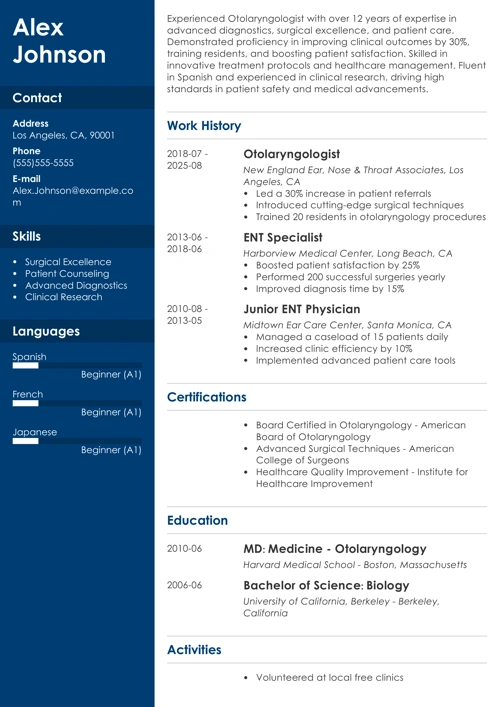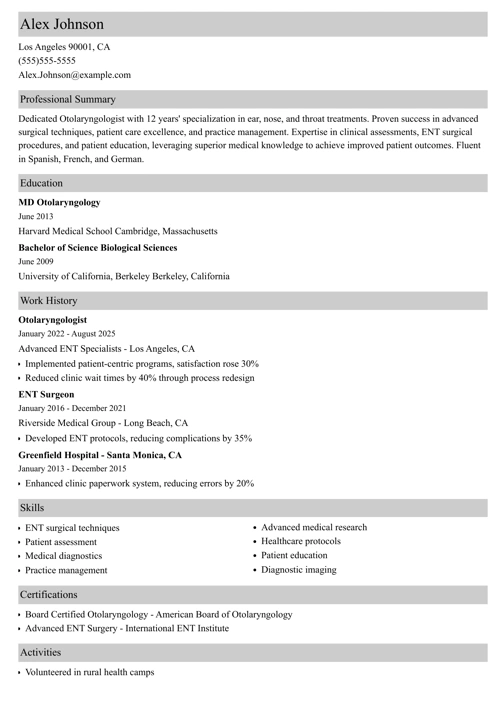Crafting an impressive otolaryngologist resume is vital for highlighting your specialized skills and commitment to the medical field. This guide provides valuable insights and detailed otolaryngologist resume examples to assist you in showcasing your professional qualifications, ensuring you make a memorable impact on prospective employers. Ready to elevate your career? Let’s get started!
This guide will show you:
- An otolaryngologist's resume example better than 9 out of 10 resumes.
- Strategies to create an otolaryngologist resume that enhances your interview prospects.
- Tips and examples for highlighting skills and accomplishments on an otolaryngologist resume.
- How to effectively present your experience on a resume to secure your desired otolaryngologist position.
Want to save time and have your resume ready in 5 minutes? Try our resume builder. It’s fast and easy to use. Plus, you’ll get ready-made content to add with one click. See 20+ resume templates and create your resume here.
Sample resume made with our builder—See more resume examples here.
Curious about more resume samples? Check them out here:
- Medical Doctor Resume Example & Writing Guide
- Physician CV Example & Writing Guide
- Healthcare Professional Resume Example & Writing Guide
- Medical Resume Example & Writing Guide
- Physician Assistant Resume Example & Writing Guide
- Medical Student CV Example & Writing Guide
- Medical Assistant Resume Example & Writing Guide
- Medical Resident CV Example & Writing Guide
- Academic CV Example & Writing Guide
- Resume Examples & Writing Guides for All Jobs
Otolaryngologist Resume Sample
Dr. Alex Johnson
Otolaryngologist
987-654-3210
alex.johnson@email.com
linkedin.com/in/alexjohnson
Summary
Compassionate and detail-oriented Otolaryngologist with over 12 years of experience in diagnosing and treating ear, nose, and throat disorders. Eager to support the innovative team at HealthFirst Clinic by providing top-notch patient care and utilizing advanced surgical techniques. Recognized for successfully performing over 500 complex surgeries with a 98% patient satisfaction rate.
Experience
Otolaryngologist
HealthCare Partners, New York, NY
June 2018–February 2025
Key Qualifications & Responsibilities
- Conducted comprehensive examinations and diagnosed ENT disorders.
- Performed advanced surgical procedures, including endoscopic sinus surgery and cochlear implants.
- Collaborated with audiologists and speech therapists to develop patient treatment plans.
- Educated patients and families on post-operative care and preventive measures.
Key Achievement:
- Developed a new protocol for managing chronic sinusitis, reducing patient recovery time by 20%.
ENT Specialist
Mount Sinai Hospital, New York, NY
July 2012–May 2018
Key Qualifications & Responsibilities
- Treated a wide range of ENT conditions, including hearing loss, vocal cord disorders, and chronic sinusitis.
- Performed laryngoscopy and audiometric assessments for accurate patient diagnoses.
- Assisted in research on minimally invasive ENT surgeries, contributing to national clinical guidelines.
- Trained and mentored medical residents in advanced diagnostic techniques.
Key Achievement:
- Introduced an improved tonsillectomy technique, reducing post-operative complications by 15%.
Education
Doctor of Medicine (MD), Otolaryngology
Johns Hopkins University School of Medicine, Baltimore, MD
August 2005–May 2009
Relevant extracurricular activities
- Member of the Otolaryngology Interest Group
- Volunteer at the Free Health Clinic
Academic achievements
- Graduated with Honors
- Recipient of the Dean’s Scholarship for Academic Excellence
Skills
- Advanced surgical techniques
- Patient care and counseling
- Diagnostic imaging interpretation
- Team collaboration
- Research and data analysis
- Medical software proficiency
- Public speaking
- Time management
Certifications
- Board Certified Otolaryngologist, American Board of Otolaryngology, 2010
- Advanced Cardiac Life Support (ACLS), American Heart Association, 2011
Awards
- 2018 – Physician of the Year, HealthCare Partners
- 2017 – Excellence in Patient Care Award, New York Medical Society
Memberships
- Member of the American Academy of Otolaryngology-Head and Neck Surgery since 2010
- Presented research on innovative sinus surgery techniques at the 2020 Annual Meeting
- Contributed to the development of national guidelines for ENT practice
Languages
- English—Native
- Spanish—Fluent
Interests
- Volunteering at local health fairs to provide free ENT screenings
- Writing articles on ENT health for medical journals and online platforms
Here’s how to write your own otolaryngologist resume:
1. Format Your Otolaryngologist Resume Template Correctly
To make a strong impression, your otolaryngologist resume should be impactful. With numerous applicants for each position, it's crucial to stand out. How can you achieve this? A well-organized resume format that appears tidy and professional can greatly boost your chances.
To format your otolaryngologist resume properly:
- Start with a resume header. Include your name, phone number, email, LinkedIn, and a link to your online portfolio. These are vital contact details for your resume.
- While including your street address is optional, it's wise to mention your city if it aligns with the employer’s location.
- Opt for a reverse-chronological resume. This resume type begins with your latest position and is the preferred resume layout among employers.
- Choose a professional font like Calibri or Arial, with an ideal font size between 10 and 12 points.
- Save your resume as “Your Name - Otolaryngologist - Resume.pdf.” A resume in PDF format ensures the layout remains intact.
- For entry-level otolaryngologists, a one-page resume length is recommended. If you have substantial achievements, a two-page resume or longer is permissible.
Uncover the elements that make a resume truly great: What Makes a Good Resume
2. Customize Your Otolaryngologist Job Description
The Bureau of Labor Statistics projects a 4% growth in employment for physicians and surgeons, including otolaryngologists, between 2023 and 2033, matching the average for all occupations. To stand out in this competitive field, highlight your medical expertise, patient care achievements, and specialized training in your work experience section. For the best results, always tailor your resume to each job offer you apply to.
Why is it crucial to tailor your resume for a specific job? Because generic resume experience sections don't land interviews. When hiring managers encounter a generic list of duties, they might think, "Sure, this person was an otolaryngologist. But how effective were they?"
Here’s how to incorporate relevant experience into your resume:
- Use the exact job title from the job listing. ATS-friendly resumes perform best with precise business position titles.
- Following the company’s name and your employment dates, include 3–6 bullet points. (Use more for recent roles, fewer for older ones.)
- Demonstrate your expertise in applicable job skills by focusing on numerous accomplishments. The most compelling achievements for a resume include metrics and KPIs.
- Start sentences with resume action verbs such as coordinated, designed, and prepared.
Otolaryngologist Resume Examples: Responsibilities
- Diagnose and treat ear, nose, and throat disorders using advanced medical techniques.
- Perform surgical procedures, including sinus surgery and tonsillectomies, with precision.
- Collaborate with other specialists to develop comprehensive treatment plans for patients.
- Conduct thorough patient assessments and interpret diagnostic tests accurately.
- Educate patients on preventative care and post-operative recovery strategies.
- Stay updated with the latest advancements in otolaryngology through continuous education.
- Lead and mentor a team of medical professionals to maintain high-quality patient care.
Remember to use action verbs that convey your responsibilities and achievements effectively. Here are some action verbs for otolaryngologist resumes:
Otolaryngologist Resume Examples: Action Verbs
- Diagnosed
- Evaluated
- Treated
- Operated
- Prescribed
- Performed
- Managed
- Consulted
- Collaborated
- Educated
Highlight your relevant experience with precision: Relevant Experience
3. Make Your Education Section Count
When it comes to emphasizing your academic achievements on a resume, simply listing your degree title, university name, and dates isn't enough. Consider having the capabilities of a complex tool at your disposal but only using it for basic actions. Demonstrating how your education has equipped you with additional skills can significantly enhance your chances of securing an interview.
Consider these resume tips:
- Position your degree prominently on your resume, ideally right after your work experience.
- If you’re a recent graduate, include courses relevant to your field to substantiate your expertise.
- Even if you're an experienced professional, consider adding bullet points if you've received fellowships, scholarships, or held leadership roles.
- Debating whether to mention your GPA on a resume? If it’s impressive, it might be worth showcasing.
Creating a resume with our builder is incredibly simple. Follow our step-by-step guide and use content from Certified Professional Resume Writers to have a resume ready in minutes.
When you’re done, Zety’s resume builder will score your resume and our resume checker will tell you exactly how to make it better.
4. Prove the Otolaryngologist Resume Skills the Company Wants
When it comes to highlighting skills on a resume, there's a strategic approach to follow. You might know the importance of listing key skills, but randomly selecting them won't do you any favors. Instead, focus on the critical skills emphasized in the job advertisement.
Here's how to effectively incorporate otolaryngologist skills into your resume:
- Treat the skills listed in the job ad as resume keywords. Integrate these into the concise skills section of your resume.
- Avoid overloading your resume with too many skills. Stick to a focused list to ensure the most relevant skills shine through.
- To increase your interview opportunities, ensure the skills you list are reflected in both your job experience and education sections.
Discover some hard skills and soft skills essential for otolaryngologists below:
Otolaryngologist Resume Skills
- Head & Neck Surgery
- Endoscopic & Microscopic Procedures
- Audiological & Vestibular Testing
- Sinus & Nasal Airway Management
- Laryngoscopy & Voice Disorder Treatment
- Hearing Loss & Tinnitus Evaluation
- Reconstructive & Cosmetic Facial Surgery
- Sleep Apnea Diagnosis & Treatment
- Minimally Invasive Surgical Techniques
- Allergy & Immunotherapy Management
- Patient Care & Counseling
- Collaborative Treatment Planning
- Leadership Skills
- Effective Communication
- Problem-Solving Skills
- Critical Thinking Skills
- Adaptability in High-Pressure Environments
- Attention To Detail
- Time Management
- Organizational Skills
- Continuous Medical Education & Research
Discover the essential Excel skills that can transform your resume into a job-winning tool: Find Out Here
5. Add Other Sections to Your Otolaryngologist Resume
Include additional sections in your otolaryngologist resume to showcase your distinct qualities. Hiring managers are interested in your capacity and enthusiasm—whether you're the proactive team player who tackles challenges head-on. By adding extras, you highlight your unique strengths and potential contributions to the team.
Here are a few additional sections that can highlight your strengths:
- Include relevant certifications you've earned, like a Board Certification in Otolaryngology.
- If you've published articles in medical journals, list them. Publications on a resume demonstrate your expertise.
- Are you a member of a professional association like the American Academy of Otolaryngology? This shows engagement and involvement in your field.
- If you've participated in medical mission trips, consider including them. Learn where to place volunteer work on a resume based on its relevance.
- If the facility’s team is multilingual, include your language skills to give you an edge. Just add them to your skills list.
Make a powerful first impression by learning how to write an effective letter of introduction: Letter of Introduction
6. Write an Otolaryngologist Resume Summary or Resume Objective
Capture the hiring manager's attention with a compelling resume introduction. Our HR statistics report reveals that they may only spend a mere 6 to 7 seconds reviewing it, so it's essential to present an engaging overview of your qualifications right from the start.
This concise introduction is known as a resume profile, akin to an elevator pitch of yourself, but much shorter—aim for a powerful paragraph to grab interest in just a few seconds.
If you possess at least a year of experience, mention it, along with your job title, how you can contribute to the organization, and some standout achievements. This is referred to as a resume summary, and it should be prominently placed at the top.
If you're writing an otolaryngologist resume with little to no experience, focus on your medical education, residency training, and research contributions. Your resume should start with a strong career objective, highlighting your expertise in head and neck surgery, audiology, or laryngology, as well as your commitment to patient care and innovation in the field. Tailoring this section to emphasize your skills and academic achievements can help position you as a promising candidate.
Discover how to create an engaging Resume Profile that showcases your skills and experience in a way that resonates with hiring managers.
7. Write a Cover Letter for Your Otolaryngologist Resume
In today's job market, you might wonder, are cover letters necessary? Absolutely! Many candidates send out generic resumes, but a personalized cover letter shows genuine interest in a specific role and company. It's tangible proof that you're not just applying to any job but this particular one.
To create an effective resume cover sheet, follow these steps:
- Adhere to a professional cover letter structure that matches your resume header and ends with a formal signoff.
- Understand how to format a cover letter with 3–5 concise paragraphs on a single page.
- Start strong by addressing your cover letter, beginning with the job title and ending with an engaging opener.
- Use the body to highlight key achievements from your resume.
- Conclude by writing a cover letter conclusion that reiterates your skills and requests a meeting to discuss your potential contributions.
- Consistently send a follow-up job application email weekly for a month. Keep it brief, and attach your resume and cover letter in PDF format.
Simplify your writing process with this clear cover letter outline: Cover Letter Outline
Plus, a great cover letter that matches your resume will give you an advantage over other candidates. You can write it in our cover letter builder here. Here's what it may look like:
See more cover letter templates and start writing.
Writing an excellent otolaryngologist resume is a step towards a fulfilling career. Remember, each element of your resume reflects your passion and expertise in the field.
About Zety’s Editorial Process
This article has been reviewed by our editorial team to make sure it follows Zety's editorial guidelines. We’re committed to sharing our expertise and giving you trustworthy career advice tailored to your needs. High-quality content is what brings over 40 million readers to our site every year. But we don't stop there. Our team conducts original research to understand the job market better, and we pride ourselves on being quoted by top universities and prime media outlets from around the world.





